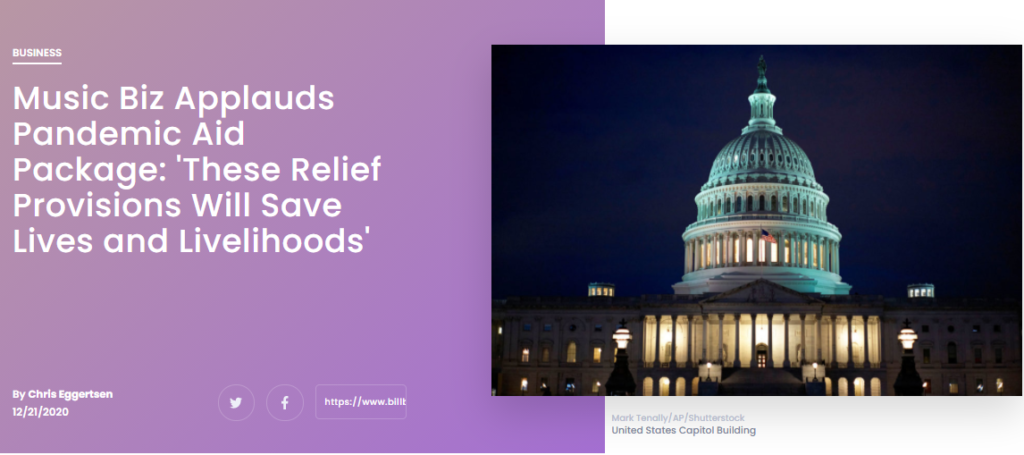Media
Billboard: Music Biz Applauds Pandemic Aid Package: ‘These Relief Provisions Will Save Lives and Livelihoods’

After Congress passed a $900 billion COVID-19 relief package Monday evening (Dec. 21), the music industry came out in force to celebrate a number of measures included that specifically benefit the music business.
A coalition of music organizations including the American Association of Independent Music (A2IM), Artists Rights Alliance (ARA), Music Artists Coalition (MAC), Nashville Songwriters Association, Recording Academy, Recording Industry Association of America (RIAA), SAG-AFTRA and Songwriters of North America (SONA) issued the following statement:
“This legislation is a much-needed lifeline for so many in the music industry who have faced loss and uncertainty for far too long through no fault of their own. We are very grateful for the extension of vital CARES Act benefits including Pandemic Unemployment Assistance, and the inclusion of the Save Our Stages Act, which will make billions of dollars in grants available to venues and live entertainment workers who have been unable to do their jobs for months. We are also thrilled by the inclusion of a dedicated $100 weekly benefit for mixed earners. Simply put, these relief provisions will save lives and livelihoods, and they are a substantial step on the road to recovery.
“We also welcome the inclusion of consensus-driven intellectual property reforms in the omnibus bill. The Copyright Alternative in Small-Claims Enforcement (CASE) Act and Protect Lawful Streaming Act (PLSA) will strengthen creators’ ability to protect their works against infringement online, and promote a safer, fairer digital environment, which are particularly needed as the arts struggle to survive the pandemic. We look forward to continuing our work to provide greater relief for the American creative community.”
Chief among the music and entertainment-focused measures included in the bill is the Save Our Stages Act, which will provide $15 billion in relief funding for “live venues, independent movie theaters and cultural institutions” that have been devastated by coronavirus-related closures. The Copyright Alternative in Small-Claims Enforcement (CASE) Act will create a small-claims adjudication system within the U.S. Copyright Office -- allowing creators engaged in copyright disputes to skirt paying exorbitant legal fees -- while the Protect Lawful Streaming Act (PLSA) will make illegal streaming for commercial profit a felony.
“This is the lifeline our industry so desperately needs to emerge from a devastating year,” said Dayna Frank, owner and CEO, First Avenue Productions and board president of the National Independent Venues Association, in a statement. “Without independent venues and promoters across the country working to engage their communities, staff, and artists, our voices would not have been heard – we are thankful for those tireless efforts. Careers came to a standstill overnight, and people continue to face personal hardships, which is why legislation like this and extending Pandemic Unemployment Assistance is essential. Our immense gratitude goes, in particular, to Senator Klobuchar, Senator Cornyn, and Senator Schumer, for securing the future of independent venues and promoters for generations to come.”
“The Recording Academy is pleased that Congress heard the call of thousands of music creators and included protections for the music community in the omnibus bill," added Recording Academy chair and interim president/CEO Harvey Mason Jr. in his own statement. "In addition to extended and improved unemployment benefits and small business loans for freelance creators, the package includes several bills which the Recording Academy, its members, and the larger music community advocated for. From the Save Our Stages Act, which provides a lifeline to performance venues and promoters, to the CASE Act, which creates an avenue for smaller creators to defend their copyrighted works, Congress has ensured that both music creators and those who act behind the scenes to bring music to life are given the support they need during this difficult time.”
Added NMPA president and CEO David Israelite: "We commend Congress for passing key legislation within today’s Omnibus bill that will help creators. The CASE Act provides a reasonable and needed pathway to justice for everyone from songwriters to photographers whose work is being used unlawfully. Additionally, the Protecting Lawful Streaming Act is crucial to enforcing copyrights by fixing the streaming ‘loophole,’ which has allowed rogue enterprises to run rampant and profit without the necessary law enforcement tools to prosecute them. Now, criminal penalties for illegal streaming will be aligned with illegal downloading and distribution. Both of these bills are important steps forward for the music industry and larger creative community and will allow songwriters to better enforce their rights."
The Copyright Office weighed in on the legislation too. “The Copyright Office has long supported a solution for the challenges posed for asserting small copyright claims, and is pleased that Congress has passed the CASE Act,” Register of Copyrights and Director of the U.S. Copyright Office Shira Perlmutter said in a statement. “We are looking forward to implementing the Act and providing access to dispute resolution for the parties involved in such claims.”
The Copyright Office also noted that the Protecting Lawful Streaming Act was the result of a negotiated process among a number of consumer and industry groups and was drafted to exclude criminal prosecution of individual users.
The passage of the CASE Act portion of the legislation marks the end of a two-decade effort to get songwriters that kind of relief for copyright infringement.
“SGA [Songwriters Guild Of America) and its allies -- including Music Creators North America (MCNA), the Society of Composers & Lyricists, the Authors Guild, and the US Copyright Alliance -- worked long and hard in support of today’s legislative victory for songwriters and composers,” according to a comment issued by the Songwriters Guild of America. “The struggle to establish a US small claims system started back in 2007 and earlier, when SGA began energetically pointing out to members of Congress that the enormous costs of federal copyright litigation, well over a quarter million dollars in many cases, had virtually destroyed the ability of music creators to enforce their rights against infringers. That ‘right without a remedy’ problem has now finally been addressed.
“SGA is extremely proud of having taken a leading role from start to finish in helping to forge this legislative solution with the assistance of the US Copyright Office, which will oversee implementation and operation of the new system,” SGA president and songwriter Rick Carnes said in a statement, with the organization adding, “Even though the law allows accused infringers the right to opt out of the process for any reason, the very fact that bad actors now know that they are being more actively monitored, and that lawsuits in federal court against them are a very real possibility should they choose to opt-out, makes the benefits of avoiding infringing activities that much more obvious. That result will drive both commerce and culture forward, to the benefit of everyone, including consumers.”
The Copyright Alliance also found much to applaud in the legislation. “We commend the House and Senate for including and passing the Consolidated Appropriations Act 2021, legislation that will bring much needed economic support for thousands of creators who have lost jobs, gigs, performances and significant income due to the pandemic,” Copyright Alliance CEO Keith Kupferschmid said in a statement. “The CASE Act has been a critical legislative priority for hundreds of thousands of photographers, illustrators, graphic artists, songwriters, authors, bloggers, YouTubers and many other creators and small businesses across the country. For far too long, these individual creators have had rights but no means of enforcing them due to the expense and complexity of federal court. With today’s passage of the CASE Act, creators will have a voluntary, inexpensive and streamlined alternative -- a small claims tribunal that will be housed within the U.S. Copyright Office -- enabling them to defend their copyrighted works from infringement... Today’s passage is a momentous victory for individual creators and small businesses who, despite strong opposition by certain internet behemoths and the organizations that they fund, did not give up their decade-long fight for a level playing field.”
The music industry organizations cited, thanked and commended Reps. Hakeem Jeffries (D-NY), Doug Collins (R-GA), House Judiciary chairman Jerry Nadler, and Sens. Thom Tillis (R-NC), John Kennedy (R-LA), Dick Durbin (D-IL), Mazie Hirono (D-HI) and Senate Judiciary Committee IP Subcommittee Ranking Member Chris Coons (D-DE) for their efforts on behalf of the music industry.
Not everyone was happy with the legislation. Fight For The Future denounced the CASE ACT and what it referred to as the Felony Streaming Act, saying that the CASE Act threatens ordinary internet user with up to $30,000 fines for “engaging in everyday activity such as downloading and image and re-uploading it. “This is atrocious,” Fight For the Future deputy director Evan Greer said in a statement, calling the legislation a handout for content companies like Disney.
While not specifically aimed at the music industry, unemployment benefits provided for in the final package will nonetheless have widespread implications for those who work within it. These include both the new round of $300 federal supplemental unemployment payments as well as extended unemployment aid for freelance workers -- who make up a sizable portion of the industry’s workforce -- through March 14, 2021. An extra $100 weekly unemployment benefit for “mixed earners” -- those who earn income both as employees and freelancers -- will benefit workers who were barred from receiving benefits under the unemployment program created for freelancers and gig workers because they qualified for traditional unemployment benefits.
One notable measure excluded from the final package was the HITS Act, which would allow musicians, technicians and producers to deduct up to $150,000 in recording expenses on their taxes in the year they were incurred. Billboard has learned that a separate effort to pass the HITS Act will continue in the new year.
Read more music industry reactions below.
BMI president & CEO Mike O’Neill: “We’re grateful that Congress has come together and passed this much needed relief package which will help many who have been impacted by this pandemic, including the songwriters and composers who have been hit particularly hard. This bill provides important relief for the self-employed, helps creators protect and enforce their rights, and importantly, provides funding for the live music venues which are so important to our songwriters’ livelihoods. We know there are still difficult months ahead, and BMI will continue working on behalf of our community, including advocating for any additional assistance needed to recover from the devastation caused by this pandemic.”
National Independent Talent Organization (NITO) president and High Road Touring founder Frank Riley: "NITO, the National Independent Talent Organization, is proud to be part of a coalition of independent venues, agencies and managers whose unrelenting and courageous efforts have resulted in a bill that will provide a life line through these terrible times, to the resumption of music and cultural activities so essential to the well being and vibrancy of local communities.We are especially grateful to all of those at NIVA, the National Independent Venue Association, for their efforts on behalf of the independent music community. Without this diligent work, without the efforts of all of our supporters, this legislation might not have come to pass. To those in Congress who heard our voices and responded with their support, especially Sen. Amy Klobuchar, D-MN, Sen. John Cornyn, R-TX, Sen. Chuck Schumer, D-NY, Speaker Nancy Pelosi and their collective staff, we are grateful for your understanding and perseverance. With the distribution of the vaccines, and some reassurance of the safety of social gatherings, all of us at NITO look forward to the return of our successful businesses that have been shuttered these past 9 months. There is much more work to be done. Anything and everything that will help the artists, and all of those who work in the production of live music events."
